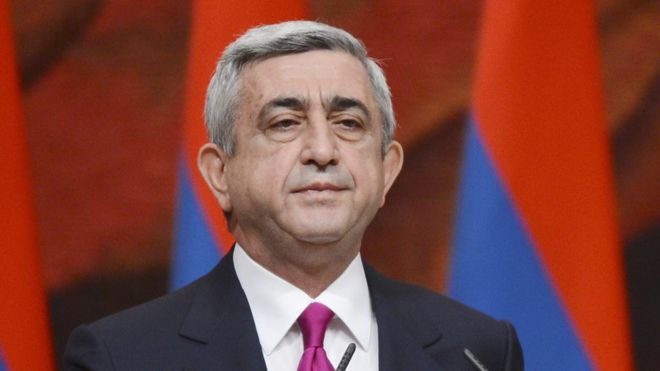
A constitutional referendum was held in Armenia last weekend on December 6th which could transform Armenia into a parliamentary republic, the BBC reports. And as many political analysts predicted, it passed overwhelmingly with 63.5% of voters voting in favor of the proposed amendments, with a turnout of over 50%, making the vote legitimate. However, many Armenians feel suspicious that the referendum is only meant to extend the rule of the country’s president, Serzh Sargsyan.
Now, there have been many claims of fraud in this referendum to push the “yes” vote forward, and more than likely this is true. As Armenia’s democratic process is severely flawed (although better than some other countries in the post-Soviet region, where democracy can be non-existent), it is sadly unsurprising that any such vote would have major irregularities. It should be noted that for this vote in particular, reports of voting irregularities from both those opposed to the referendum and European observers has exceeded most other Armenian votes, with many sources citing electoral fraud, vote-bullying, and even violence to secure a “yes” vote. However, with the referendum ending in a “yes” vote and most members of the National Assembly in favor of the amendments, it is very likely that these changes will be enacted. Let us take a moment to go over the potential implications of this referendum.
The Armenian Referendum is supported by the ruling Republican Party of Armenia and many other major parties in the National Assembly, as well as President Sargsyan. Assuming the results of the referendum are respected, the National Assembly will enact a variety of amendments to the Armenian Constitution, most notable of which being that the government of Armenia will shift from a semi-presidential republic to a parliamentary republic. This will transfer most of the powers that the current President of Armenia has to the Prime Minister of the country instead, and the president would largely become a ceremonial figurehead of the country. It will also have the President, who becomes stripped of most of his obligations, be elected by Armenia’s parliament, the National Assembly, rather than through direct election. The Prime Minister will thus become the commander-in-chief, not the president.
Supporters of the referendum and proposed changes to the Constitution argue that these changes to Armenia’s Constitution are meant to strengthen and bolster democracy in the country. However, opposition groups claim otherwise, stating that the changes are only meant to extend the rule of the current president. As president, Sargsyan is limited to two five-year terms; his second term will expire in 2018. However, some predict that, once again assuming that the Constitution is changed, Sargsyan will simply become the Prime Minister of the ruling Republican Party. While Sargsyan does not officially claim membership to this party as he is forced to be independent, the Republican Party of Armenia has largely backed his presidency since the beginning. And if he does become prime minister, then he would have a new list of broad powers that he basically had as president. Sargsyan and other supporters deny that this scenario will occur, and constantly stress that Sargsyan does not seek a third term, although suspicions remain abound.
Most of the parties in the National Assembly support the amendments; however, citing these aforementioned allegations, three parties are not in favor: the Armenian National Congress party, the Heritage party, and the Rule of Law party. These groups combined make up a walloping 14 seats out of Armenia’s 131 legislative branch. No matter what, they will not be able to do much to stop this. However, they are not the only one suspicious: in fact, many Armenians saw this referendum simply as a mode for Sargsyan to extend his rule. And with the overwhelming reports of increased irregularities occurring in favor of a “yes” vote, it is only looking even more likely that the government has some sort of ulterior motive in pushing for a referendum that would strip the president of nearly all of his powers. For measures that are supposed to “strengthen democracy” in Armenia, the vote itself was not very democratic at all.
The proposed constitutional changes are not necessarily bad on their own. There are many parliamentary republics around the world that have very respected and high-functioning democratic systems. But with the current corrupt system that is in place in Armenia right now, there is so much room for abuse, particularly by the ruling party and President Sargsyan. If the conduct of the referendum is any indication for how these new changes will be implemented, then we must remain weary of them.